Reprinted from Fun Stuff News.
International Women’s Day (“Международный женский день,” pronounced “Myezhdoonarodnee zhenskee dyen”) is celebrated on March 8th. Some say that the origins of this holiday can be traced back to the Socialist Party in the United States. At the beginning of the 20th century, socialist in the US were promoting equal rights for women and motivated socialist in other countries to do the same. In 1910, German socialist Klara Zetkin proposed an International Women’s Day. Instead of men treating women nicely, the women went on strike and marched through the streets. On March 8th, 1917, Klara Zetkin and her Russian counterpart Alexandra Kollontai, held a women’s strike “for bread and peace” in St. Petersburg. This was soon followed by a general strike that triggered the March Revolution which brought down Tsar Nicholas II. Today the holiday has lost its political significance. Instead, it has become popular for other reasons: Men are supposed to give women gifts
on March 8th. They are also supposed to do all the housework on this day – at least in theory. You should make the effort to give a small gift (e.g., chocolates or flowers) and a greeting card to your female colleagues, friends, and relatives on this important holiday.
Maslenitsa (Shrovetide) (“Масленица”, pronounced “Masleneetsa”) is a
traditional Russian spring celebration also referred to as “Pancake Week,” “Cheese Week,” or “Butter Week.” It comes right before the seven-week Orthodox Lent. The word “Maslenitsa” refers to the Russian word “maslo”, meaning “butter.” It refers to the fact that all kinds of different foods, including butter and other fats, may be consumed before the seven-week Orthodox Lent. Christian historians say that those were really mad days in the past. Originally a pagan holiday celebrating the end of winter and the beginning of spring, pancakes were baked as a form of worship of the life-giving sun. People wore funny masks and costumes, and sometimes men wore women’s clothing and vice a versa. Lots of good food and a lot of wine – all of which were forbidden during the ensuing Lent – were consumed during this merry festival. A big straw doll (“Maslyona”) was built and burned on the last day of Maslenitsa to say a final goodbye to winter. Fist fighting was another popular activity that helped keep people warm and sometimes turned violent. Everyone from peasants to tsars and grand princes took part in the celebrations, which also included merry troika rides. Today this colorful celebration is once again gaining popularity, and numerous celebrations
are held during this week, in particular in Moscow’s many parks. Throughout the entire week, people make pancakes that are served with fresh cream, butter, honey, and sometimes caviar. Maslenitsa consists of three main parts: the Meeting (“Vstryecha”) of Maslenitsa on Monday; “Sheerokovaya (“Broad”) Maslenitsa,” or the peak of festive occasion, on Thursday; and the last day, the good-bye day, which comes on Sunday morning and was also referred to as Forgiveness Day (“Prashyonnoye Vaskresen’ye”) because people would ask each other for forgiveness on this day. Also on this day, godchildren would visit their godfathers and godmothers, and the big straw doll “Masylona” was burned together with any remaining foods that are forbidden during Lent.
In 2008, Maslenitsa will be celebrated from March 3rd to March 9th and many events will be held in various locations in Moscow. Restaurants will offer special Maslenitsa menus. Maslenitsa activities (including folk shows, fairs, pancake sales, concerts, ritual burnings of the Maslenitsa effigy, carnival marches, horse sleigh rides, and fireworks) usually take place on Vasilievsky Spusk (that’s the big slope leading from
Red Square down towards the Moskva River ), at the All-Russia Exhibition Center (VVTs) at Metro VDNKh, and at the Kolomenskoye Open-Air Art Museum and Nature Preserve at Metro Kolomenskaya. Information on Maslenitsa events can be found on here: http://www.maslenitsa.ru (Rus).
Right after Maslenitsa comes the seven-week Lent (“Великий пост”; pronounced “Veleekee post”) leading
right up to Easter. Orthodox Russians who take this fasting period very seriously will not consume any milk, eggs, or meat, with fish being eaten only on special occasions. With the exception of small sips of Kagor (a sweet locally produced red church wine), alcohol is also forbidden. The fast is broken on Easter Sunday with a lavish meal. Orthodox marriages cannot take place during Lent.
April 1st is April Fool’s Day (“День смеха”, pronounced “Dyen smyekha,” literally meaning “Day of Laughter.” This day is also referred to as “День Дураков,” meaning “Idiot’s Day,” pronounced “Dyen Doorakov”). This is a day of fun and laughter but not a public holiday. People tell jokes to each other and newspapers and TV publish/run funny stories and jokes. The motto of this day is “Don’t trust anybody on April 1st” (“Первое апреля – никому не верю,” pronounced “pyervoye aprelya – neekamoo nye veryoo”).
Monday, March 3, 2008
Subscribe to:
Post Comments (Atom)
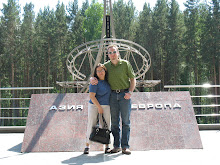









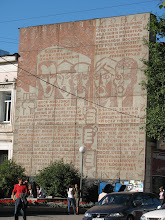
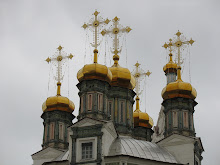
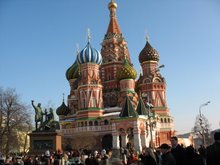
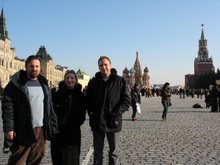
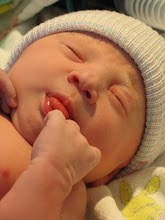
No comments:
Post a Comment